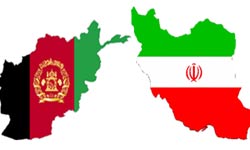Afghanistan, Iran Could See a Boost in Trade Unless Washington Interferes
 Michael Hughes
Michael Hughes
January 2, 2020
Tehran is looking forward to enhancing trade ties with Afghanistan in the coming months once a railway project connecting the two countries is finalized. However, although the United States has refrained from interfering in the development of this endeavor, Washington may take action to ensure anti-Iranian sanctions are effectively isolating Tehran as tensions continue to escalate.
Abbas Khatibi, a deputy to Iran’s transportation minister, told Press TV on December 28 that Tehran expects the construction of the line between Khaf and Herat to be completed in March. Afghanistan is expected to especially benefit from the infrastructure initiative, according to the report, given the port city of Chabahar, which sits on the Gulf of Oman, will be connected to the Afghan border town of Zahedan.
The Chabahar port project began due to an agreement signed by Afghanistan, India, and Iran in 2016. The port is located in the Sistan-Baluchistan Province on Iran’s southeastern coast and could enhance regional maritime traffic to Afghanistan and Central Asia.
The project would also provide a solid alternative to Afghanistan-Pakistan trade routes, officials told Tolo News, given that the Chabahar port is some 700 kilometers closer than the Karachi port.
The Trump administration initially exempted the port from sanctions and on December 25 provided written assurances to India that it will help facilitate global banks to fund $85 million in equipment for the port.
However, Tolo News recently reported that officials in Kabul claim that, despite the exemptions, U.S. sanctions against Iran have affected Afghan trade through the port. Moreover, it is not clear that the U.S. sanctions waivers cover post-construction trade with Iran.
Iran would certainly welcome such commerce in light of the draconian sanctions the United States has implemented since the Trump administration exited the nuclear deal in May of 2018.
U.S. measures to date have targeted some of Iran’s most critical economic sectors including the oil trade. In fact, sanctions targeting the metals industry alone could negatively affect more than 20 million Iranian workers. War crimes lawyer Francis Boyle claimed the sanctions on Iran are so destructive that they amount to crimes against humanity as defined by the International Criminal Court (ICC).
And whether or not the Afghans – or all of Central and South Asia for that matter – benefit from the project is irrelevant to the Trump administration especially considering U.S.-Iranian tensions have recently risen to brand new heights.
U.S. President Donald Trump in a tweet on New Year’s Eve threatened Iran for allegedly orchestrating an attack on the American embassy in Iraq. The uprising in Baghdad was sparked by U.S. airstrikes that targeted Hezbollah-linked militia groups near Iraq’s border with Syria.
Not long after Trump’s twitter storm, the Pentagon deployed around 750 American troops to the region. Tehran dismissed involvement in the protests but analysts have long warned that U.S. efforts to strangle Iran’s economy would force the Iranians to lash out in self-defense.
Considering the United States has already showed a willingness to starve a shocking number of people, one can bet Washington will do almost anything to hurt Iran short of a politically unpalatable invasion.
However, the United States also has to deal with conflicting national interests.
Mohammad Soltaninejad from the University of Tehran has said that with the U.S. possibly withdrawing troops from Afghanistan the Trump administration may rely on India to protect American interests by fighting terrorism and boosting Kabul. Yet, in order to do this India needs access to Afghanistan.
“Given the rivalry between India and Pakistan, Iran remains the best route that connects India to Afghanistan. This explains the United States’ decision to waive sanctions on India’s investment in Chabahar,” Soltaninejad said in a piece published on East Asia Forum.
Then again, the author also argues that Tehran is not convinced that the project will be an effective way to counter U.S. sanctions given India owes its rise in power to the United States. Iran sees China as a more likely long-term strategic economic partner.
“China’s rise is quite different from that of India’s. India’s economic and military development contributes more to preserving the pro-U.S. international status quo, while China’s rise is seen to come at the cost of the United States’ global position and points towards a balanced global power distribution,” he added.
Yet the analyst also pointed out that public opinion in Iran would not support a close partnership with China.
At the end of the day, it appears there are basically too many variables at play to hazard a guess as to the future of Iran-Afghan trade vis-à-vis Washington’s policies. However, a war between Iran and the United States would, at a minimum, discourage investors and traders despite any sanctions exemptions.
In short, once again, Afghanistan’s fate is left to the geopolitical machinations of external powers.
